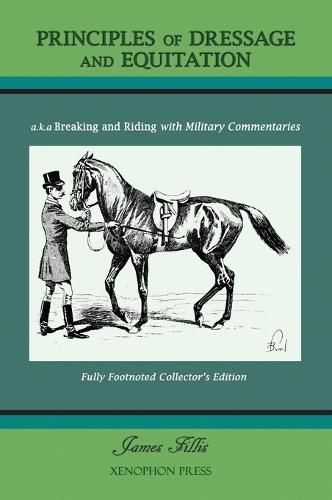Readings Newsletter
Become a Readings Member to make your shopping experience even easier.
Sign in or sign up for free!
You’re not far away from qualifying for FREE standard shipping within Australia
You’ve qualified for FREE standard shipping within Australia
The cart is loading…






This title is printed to order. This book may have been self-published. If so, we cannot guarantee the quality of the content. In the main most books will have gone through the editing process however some may not. We therefore suggest that you be aware of this before ordering this book. If in doubt check either the author or publisher’s details as we are unable to accept any returns unless they are faulty. Please contact us if you have any questions.
James Fillis’ (1834-1913) contribution to the development of dressage as we know it today cannot be overlooked. Fillis was a pupil of Francois Caron, who was a direct pupil of Francois Baucher. Fillis also studied with Victor Franconi. Fillis was widely revered and respected by his contemporaries as a master horse trainer.
There are simple truths that James Fillis expressed very clearly in his first French language text, Principes de dressage et d'equitation. This text, translated by M. H. Hayes was given the title: Breaking and Riding. Today, the term ‘breaking’ is not looked upon with favor in the equestrian community. Notwithstanding the good intentions of Mr. Hayes, in this unique edition, Xenophon Press has used the exact literal translation of the original French title hence our edition is entitled: Principles of Dressage and Equitation. In fairness to M. H. Hayes, the Duke of Newcastle defined ‘Break’ as follows:
to break a horse in trotting, is to make him light upon the hand by trotting, in order to make him fit for a gallop. To break a horse for hunting, is to supple him, to make him take the habit of running.
In the original French text, where Fillis used the term dressage to refer to basic training, we have used the term ‘training’ instead of ‘breaking.’ And, where Fillis used the term dressage to refer to haute ecole, we have used the term ‘dressage’ instead of ‘breaking.’ These re-translations are closer to Fillis’ original meaning.
Our re-titled text with direct translations of the original French content sheds new positive light on Fillis’ historically important magnum opus. Our fully footnoted edition is richly annotated and contains all the additional material from the authoritative J. A. Allen edition by exclusive permission granted to Xenophon Press. We are especially grateful for the proofreading of Brenner Klenzman in this edition.
This exclusive edition of Principles of Dressage and Equitation is the only edition available both in print and as an e-book.
$9.00 standard shipping within Australia
FREE standard shipping within Australia for orders over $100.00
Express & International shipping calculated at checkout
This title is printed to order. This book may have been self-published. If so, we cannot guarantee the quality of the content. In the main most books will have gone through the editing process however some may not. We therefore suggest that you be aware of this before ordering this book. If in doubt check either the author or publisher’s details as we are unable to accept any returns unless they are faulty. Please contact us if you have any questions.
James Fillis’ (1834-1913) contribution to the development of dressage as we know it today cannot be overlooked. Fillis was a pupil of Francois Caron, who was a direct pupil of Francois Baucher. Fillis also studied with Victor Franconi. Fillis was widely revered and respected by his contemporaries as a master horse trainer.
There are simple truths that James Fillis expressed very clearly in his first French language text, Principes de dressage et d'equitation. This text, translated by M. H. Hayes was given the title: Breaking and Riding. Today, the term ‘breaking’ is not looked upon with favor in the equestrian community. Notwithstanding the good intentions of Mr. Hayes, in this unique edition, Xenophon Press has used the exact literal translation of the original French title hence our edition is entitled: Principles of Dressage and Equitation. In fairness to M. H. Hayes, the Duke of Newcastle defined ‘Break’ as follows:
to break a horse in trotting, is to make him light upon the hand by trotting, in order to make him fit for a gallop. To break a horse for hunting, is to supple him, to make him take the habit of running.
In the original French text, where Fillis used the term dressage to refer to basic training, we have used the term ‘training’ instead of ‘breaking.’ And, where Fillis used the term dressage to refer to haute ecole, we have used the term ‘dressage’ instead of ‘breaking.’ These re-translations are closer to Fillis’ original meaning.
Our re-titled text with direct translations of the original French content sheds new positive light on Fillis’ historically important magnum opus. Our fully footnoted edition is richly annotated and contains all the additional material from the authoritative J. A. Allen edition by exclusive permission granted to Xenophon Press. We are especially grateful for the proofreading of Brenner Klenzman in this edition.
This exclusive edition of Principles of Dressage and Equitation is the only edition available both in print and as an e-book.